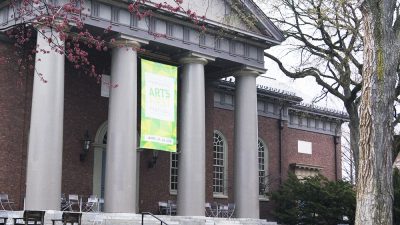
Last week, Harvard University research and teaching assistants voted to unionize, allowing them to collectively bargain with the university for better conditions and payment. This historic result prompts questions of similar efforts occuring at Boston University.
The Harvard students’ vote to unionize was held April 18 and 19, resulting in 1,932 ballots cast in favor of and 1,532 against creating a graduate student union, according to The Harvard Crimson. The ballot tallying was conducted by the National Labor Relations Board at their regional office Friday.
Now, Harvard graduate students can collectively bargain with their administration, which they previously had been unable to do.
The Boston University Graduate Workers Union-United Auto Workers is advocating for the working rights of graduate student employees at BU.
While the union is not currently recognized by the BU administration, the organization hopes to collectively bargain with them regarding graduate students’ employment, said Lizzy Karnaukh, a second year doctoral candidate in the Graduate School of Arts and Sciences and a member of the BUGWU-UAW.
Karnaukh said she feels great about the fact that Harvard graduate students have formed an officially recognized union.
“It’s a really incredible thing,” Karnaukh said. “It’s really powerful. It shows the measure of solidarity and building power in working to improve the working conditions of graduate students.”
Karnaukh said she thinks Harvard’s new union will positively affect the progress of the BUGWU-UAW.
“We looked at our colleagues across the river and we see that they can win a [graduate student] union,” Karnaukh said. “That’s really exciting for us because it’s fresh momentum for us to build off of in our own organizing on our campus.”
Daniel Kleinman, the associate provost for graduate affairs at BU, said he is unaware of any current efforts by BU graduate students to unionize. BU currently provides doctoral students with five years of guaranteed funding that includes tuition, health insurance, mandatory fees and a stipend, Kleinman said.
For some students, he said, especially those studying the sciences, the stipend covers the entire year. For other students, typically those in the humanities, they are paid for eight months of the year.
Kleinman said students are eligible to receive stipends through becoming teaching fellows or research assistants. Alternatively, students can also receive a non-service stipend. He said graduate students do not work more than 20 hours a week.
“Ph.D. students are students, and we are seeking to provide them with an education, and teaching and research is generally part of that education,” Kleinman said.
Next year, stipends will go up by 3 percent, Kleinman said. The eight-month stipend will be $22,660 and the 12-month stipend be $33,990.
Alice Jayoung Jang, a second-year graduate student in the Questrom School of Business, wrote in a Facebook message that she is in full support of graduate students’ unionization. She wrote that she thinks unionization is necessary for the betterment of students’ lives and performance in their studies.
“The graduate students’ stipend is enough to make a living, [but] considering the living expense in Boston, it is almost impossible to keep other parts of life besides working in the office,” Jang wrote.
Jang wrote that she thinks BU should have an official graduate student union like Harvard, but students should be cautious of trying to model their approach exactly like Harvard’s.
“We should be cautious about what to bring to the table,” Jang wrote. “We are not Harvard. The students at BU could have different needs and wants, as we have [a] different working environment.”
Mark Harrison Ingraham, a third-year doctoral candidate in GRS, wrote in a Facebook message that he thinks a graduate student union at BU is necessary because graduate students have many challenges, specifically with regard to not getting paid year-round.
Ingraham wrote that even though he is not likely to be paid in the summer, he signed an agreement when starting at BU stating that he would not seek outside employment.
“My landlord won’t accept that I’m just not paid in May and August,” Ingraham wrote. “My 15-year-old son doesn’t stop existing during those months. Yet despite my and others bringing up this problem to administration many years running, they have done nothing about it.”
Ingraham wrote that he thinks it is extremely challenging, if not impossible, to complete a doctorate degree at BU if one is not independently wealthy. As a result of these challenges, even though he wants to finish his doctorate, Ingraham is trying to change his program to a master’s degree so he can leave BU to get a job elsewhere.
“I have essentially no official support from BU,” Ingraham wrote. “We do a tremendous amount of the teaching and grading for undergraduates here, as well as the research. We should be valued for that.”























































































































